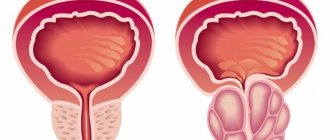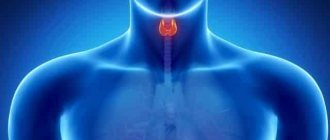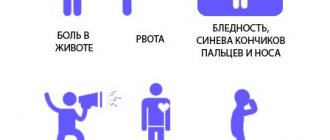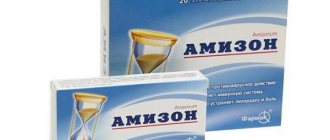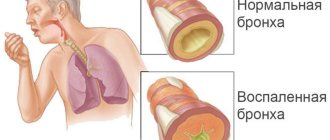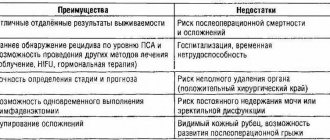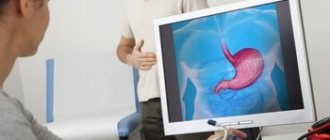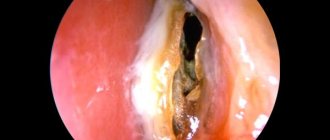Today it is worth discussing the symptoms of prostatitis and prostate adenoma in men in particular detail, because they manifest themselves differently and depend on the stage of the disease. Benign prostatic hyperplasia (BPH), which is colloquially called prostate adenoma, is a benign neoplasm in the prostate gland that develops over time and causes discomfort to a man, and usually an adenoma occurs against the background of ignored inflammation of the prostate, so it is recommended to discuss these diseases together. with a friend.
Why do men develop prostatitis?
There are many causes of prostatitis.
- Disorder of blood circulation in the pelvic area, which contributes to the enlargement of the organ. This can occur as a result of an inactive lifestyle and excess weight.
- Bacterial infection due to gonorrhea, urethritis, tuberculosis, tonsillitis and its complications. Often the infection can spread to this organ as a result of acute respiratory pathologies.
- Inflammation can begin due to an infection entering the prostate, spreading through the blood or lymph.
- Injuries to the pelvis, disruption of its normal blood supply. Drivers are very susceptible to prostate inflammation, since their work involves shaking or vibration. Cyclists face the same danger.
- Constant hypothermia.
- Chronic pathologies of the urinary organs.
- Low physical activity and a sedentary lifestyle lead to the development of stagnation in the pelvis. They, in turn, lead to the rapid development of pathogenic microorganisms.
- Excessive sexual activity leads to disruption of the hormonal system in men and mental exhaustion. All this leads to potency disorder. Interrupted intimate acts have a negative impact on health.
- Inflammatory phenomena in the rectum and urethra contribute to the movement of infection into the prostate. If there is inflammation of the urethra, bacteria enter the organ from infected urine.
- Constipation is a predisposing factor in the development of prostatitis, as it increases pressure in the pelvis and irritates the prostate.
- Impaired functioning of the immune system due to addictions, consumption of alcoholic beverages, emotional stress and fatigue, poor nutrition, and sleep disturbances. In such cases, a person becomes vulnerable to many infectious pathologies.
Causes of the disease↑
Despite the high frequency of this pathology, a huge number of studies devoted to it today do not fully understand what is its cause. Some experts believe that the main reason for pathological changes in size is age-related changes in the hormonal system.
Indeed, over the years, the male body begins to produce less testosterone, and the level of female sex hormones estrogen, on the contrary, increases. This change in hormonal levels stimulates the division of prostate cells, the emergence of a benign neoplasm and its growth.
Possible causes of adenoma also include:
- Lack of physical activity in old age;
- Hard work and stress;
- Inflammatory diseases of the genitourinary organs;
- Diseases of the cardiovascular system;
- Sexually transmitted diseases that the man had previously suffered;
- Bad habits;
- Environmental pollution.
Symptoms of the disease
Symptoms of prostatitis in men can vary depending on the form of its occurrence - acute or chronic. There are non-bacterial acute and chronic prostatitis, acute prostatitis, and infectious prostatitis. In recent decades, the asymptomatic form of this male disease has been diagnosed more often.
Some men do not know what prostatitis is and are in no hurry to see a doctor even if they have symptoms of acute inflammation of the organ. The first signs of acute prostatitis in men are increased urine output, pain in the perineum, fever, and early ejaculation.
Signs of acute prostate cancer are:
- general weakness, hyperthermia;
- chills, sometimes fever;
- severe pain in the perineal area, which gradually spreads to the groin and intensifies significantly during bowel movements or urination;
- frequent urges to micturate, which do not bring relief to the man;
- increased sweating;
- pain and itching in the prostate;
- feeling of constantly full urinary tract;
- complaints of increased irritability.
Bacterial prostatitis has the same symptoms.
The acute type of the disease manifests itself very sharply. A person’s body temperature rises significantly and quickly, nausea and even vomiting appear. The process of urination is disrupted, cramps and pain appear.
Chronic prostatitis can often be asymptomatic. Patients may not even pay attention to signs of discomfort and prostate damage. Manifestations of a chronic type of pathology are:
- deterioration of health;
- erectile dysfunction and early ejaculation (18 drugs to improve erection);
- nervous dysfunctions;
- periodic and passing pain in the pubic area, groin, perineum;
- change in the speed of sexual intercourse (and it can either lengthen or significantly shorten);
- lack of vivid sensations during intimate contact;
- the appearance of mucous or whitish discharge from the urethra, especially in the morning;
- disturbance of urination (it becomes frequent, intermittent, sometimes a man has to strain in order to completely empty the bladder);
- the appearance of residual urine.
In the photo you can see what the affected prostate and its adjacent organs look like.
Symptoms and treatment of prostatitis are interrelated. If an asymptomatic form of the pathology appears in men, it can be very difficult to diagnose. At the same time, prescribing a suitable drug will help quickly relieve inflammation in the prostate.
Signs of stage 1
Symptoms of prostate adenoma progress over 3 consecutive stages. At the 1st (compensated) stage, the signs of the disease are subtle; they include weak stream, increased urge, especially at night, strong pressure in the urethra, difficulty starting and during urination. Sometimes the procedure of emptying the bladder is painful, and blood is visible in the urine. Additionally, the patient feels:
It is possible to restore erectile function! Proven FOLK CARE ... Reviews My story spotenciey.ru
Treatment of PROSTATITIS using a new method To restore the functions of the prostate, you need every day... Website Interview with a doctor bezprostatita.ru
The problem of the small size of the dignity has been solved. The mechanism of erection has been revealed... Official website Recovery bigbigrazmer.ru
At the 1st (compensated) stage, sometimes the procedure of emptying the bladder is painful, severe pain is felt in the groin, radiating to the testicular area
- severe pain in the groin, radiating to the testicles;
- feeling of strong and almost constant pressure in the bladder;
- the need to make an effort to start urinating;
- feeling of bladder fullness;
- rarely – erectile dysfunction.
Echo signs as the results of an ultrasound examination already at this stage demonstrate that nodules (one or several) have formed in the prostate, increasing enough to affect the patency of the urethra. Problems with getting rid of urine lead to bladder overflow and stagnation, as a result of which inflammation develops, and since the walls of the bladder weaken and lose tone, incontinence becomes a possible scenario. Although such formations are benign and do not metastasize, they are easier to treat at this stage than at subsequent stages, and the consequences may be much less.
Men who contact a urologist in a timely manner and begin treatment can cope with the symptoms characteristic of the first stage of BPH quite easily, and after just one course of medication they usually return to their normal lives.
Features of pathology diagnosis
To make a correct diagnosis, the patient must contact a urologist. In addition to the mandatory medical examination, such tests and examinations are necessary.
- Analysis of urine. A general examination with the study of microflora is necessary.
- Identification of pathologies that can be sexually transmitted.
- A smear from the urethra can detect the presence of a bacterial infection.
- Sperm analysis.
- Ultrasound of the pelvis.
- Urography.
- Gland biopsy (if cancer is suspected).
Diagnosis of prostatitis should be comprehensive. The patient cannot check the prostate on his own: this requires a visit to the doctor and a set of diagnostic measures.
Diagnosis of stage 1 prostate adenoma
Diagnosis of BPH is made in several ways:
- General urine analysis - with its help you can detect inflammatory processes in the body;
- PSA analysis - used to detect malignant neoplasms;
- Ultrasound - with its help you can find out the approximate size of the prostate, as well as study in more detail the characteristics of the residual fluid;
- Uroflowmetry - determines the level of disorders associated with the outflow of urine.
During all tests, the patient must monitor the quality and count the number of urinations. These observations will help determine the most appropriate treatment methods.
In some cases, the attending physician may prescribe a cystoscopy, during which a special tube with a camera and light is inserted into the urethra. With its help, a specialist will be able to determine the structural features and presence of abnormalities of the genitourinary system.
Methods of treating the disease
There are different approaches to the treatment of acute and chronic inflammation of the prostate gland. But in any case, the patient needs drugs for prostatitis, fast-acting and inexpensive.
The treatment strategy for acute prostatitis is as follows:
- careful adherence to bed rest;
- use of antibiotics;
- prescribing drugs that help normalize blood microcirculation in the pelvic area and increase its fluidity (Cavinton, Trental, Detralex);
- the use of non-steroidal anti-inflammatory drugs - Ketoprofen, Ibuprofen, Indomethacin Voltaren, Piroxicam to reduce the intensity of pain and inflammation;
- the use of stronger medications - such as Nimesil, Tempalgin - in cases where the pain syndrome due to inflammation of the prostate is very severe;
- medications are prescribed to quickly relieve the inflammatory urological process - Lidaza,
- To relieve pain and inflammation, rectal suppositories are used for prostatitis with an anti-inflammatory and analgesic effect. Among them are Detoxamine, suppositories with propolis for prostatitis, with cocoa butter, and Diclofenac suppositories.
Ichthyol, methyluracil, and phytor suppositories have proven their effectiveness. The drug Propolis DN gently relieves the manifestations of the inflammatory process in the prostate gland, improves blood circulation in the pelvic organs.
In case of severe poisoning of the body with inflammatory products, it is necessary to administer rheological solutions, electrolytes and substances that relieve poisoning. The use of Hemodez, Disol, Trisol, Ringer's composition, and potassium chloride is indicated.
Antibiotic suppositories are indicated for use in cases where the patient has severe intolerance to antibacterial drugs. Local use of antibiotics reduces the risk of systemic damage to the body.
There are cases when a patient needs to undergo surgery. In particular, it is urgently needed in case of urinary retention, when the patient cannot empty the urine on his own.
Important! The use of antibiotics for bacterial prostatitis is mandatory. Without them, the disease can develop into a chronic and difficult to treat form.
Antibiotics for prostate inflammation
In case of inflammation of this organ, modern effective antibacterial agents are prescribed. Moreover, the doctor can use fluoroquinolones - Levofloxacin, Ciprofloxacin or Ofloxacin. This therapy is needed to kill gram-negative microflora. Drugs from the fluoroquinolone group help fight tuberculosis. They are usually prescribed intramuscularly. Antibiotics can also be prescribed as first aid for the acute onset of pathology.
Drugs from the fluoroquinolone group are effective in the treatment of acute and chronic forms of inflammation of the prostate, as they spread into its tissue and remain there in high concentrations necessary for the death of microorganisms.
The risk of side effects usually does not exceed 17%. It can increase significantly in cases where the patient suffers from pathologies of the kidneys and liver. Among the side effects that often develop are:
- nausea, vomiting;
- dizziness;
- increased skin sensitivity to sunlight;
- heart rhythm disorder.
If fluoroquinolones do not bring noticeable results within the first two days from the start of treatment, then they are replaced with macrolides (Sumamed, Azithromycin, Clarithromycin), cephalosporins (Cefazolin, Kefzol, Suprax, Cefpirom, Ceftriaxone). All tablets for prostatitis, inexpensive and effective, can cause a number of side effects, and therefore they should be taken only under the supervision of a doctor.
In some cases, the patient is prescribed drugs such as Fluconazole, Tanavik, Vilprafen, Amoxiclav, Augmentin, Ampicillin, Tambuil.
If there is no recovery within 2 weeks, the doctor adjusts the therapy. After this, you need to undergo an ultrasound of the prostate and take gland secretions.
Features of the treatment of chronic prostatitis
The best results are achieved through comprehensive treatment. Antibacterial drugs should be prescribed only if the causative agent of such a disease has been precisely isolated. The treatment tactics for patients with chronic prostatitis are as follows.
- Use of non-steroidal anti-inflammatory drugs.
- The use of medications that promote the drainage of lymph from the affected area of the body.
- Prescription of immunomodulators - such as Timolina, Vitaprost, Thymosin. They help relieve swelling and reduce the likelihood of blood clots.
- The purpose of anticholinergics is to reduce the intensity of inflammatory processes.
- If you have problems with erection, you need to take antidepressants and anti-anxiety medications.
- To strengthen the pelvic muscles, it is necessary to perform therapeutic exercises.
- Physiotherapeutic treatment, such as rectal electrophoresis, hyperthermia, UHF, etc., has a positive effect.
About prostate massage
Prostate massage is not only a preventive, but also a therapeutic procedure. In case of acute inflammation, it will cause harm. However, in case of chronic prostatitis, massage can eliminate congestion and thereby prevent further progression of the pathology.
It is better to have this procedure done by a doctor. The specialist does not prescribe massage if the patient has acute hemorrhoids or anal fissures.
Treatment with non-bacterial drugs
To get rid of chronic prostatitis, there are a huge number of medications for the treatment of prostatitis that have an active effect on the organ affected by the disease. There are a large number of such drugs. Only a doctor can determine how to treat prostatitis after a comprehensive diagnosis.
The homeopathic remedy Afala is available in the form of tablets that can dissolve in the mouth. They have a pronounced analgesic and anti-inflammatory effect.
Prostamol Uno is an effective herbal remedy for getting rid of chronic prostatitis. The active ingredient is sabal palm extract. It effectively eliminates dysuric phenomena.
The drug Vitaprost contains extracts of the prostate gland of animal origin. It is taken to relieve chronic pain syndrome in patients. Vitaprost improves metabolic processes in prostate tissues and strengthens local immunity.
Prostatilen is an effective drug against acute and chronic prostatitis. Available in the form of rectal suppositories and lyophilized powder. When administered by injection, a single injection of 5 ml of solution in novocaine is allowed. Injections are given once a day. Suppositories are used for 10 days.
Prostalamin is an inexpensive Russian tablet for the genitourinary system containing an extract from the prostate gland of cattle. It helps well with prostatitis, congestion in the pelvic area, erectile dysfunction and ejaculation.
Speman contains extracts:
- Argyreans;
- Tribulus creeping;
- male orchis;
- leptadenia reticularis;
- compass lettuce;
- pearl armelia;
- suvarnavangi;
- velvet beans.
Such drugs as Prostopin, Diclovit, Prostatofit, Prostatin, Prostatovid, Adenoprosin have a similar effect. Individual intolerance to such components is very rare.
Ointments for prostatitis are rarely used. The doctor may prescribe capsules with multivitamins and microelements to improve the functioning of the immune system.
Types of adenoma
- The roots of the adenoma grow into the bladder, while they destroy the internal sphincters. Dysfunction is diagnosed.
- The tissue is distributed evenly throughout the urinary canal, there are no pathological symptoms. This species is rare.
- The bladder does not empty completely: a compaction interferes, which affects the rectal area.
[ads-pc-1]
The severity of urinary disorder does not directly depend on the size of the prostate tumor. But the decisive factor is still its growth. A small tumor above the urethra significantly affects the health and condition of the body as a whole, so it must be localized and treated in a timely manner. If the tumor forms in the area of the lateral periurethal glands, it may be asymptomatic.
Nutrition for prostatitis
During treatment of chronic prostatitis, it is recommended to adjust your diet. Patients should:
- stop drinking alcoholic beverages;
- limit salt intake;
- ensure drinking regime (consume at least 1.5 liters of water daily).
In case of exacerbation, fried foods should also be avoided. All dishes must be steamed. It is advisable to exclude protein foods.
During the treatment of acute prostatitis, you need to completely avoid (or limit to a minimum) the following foods and drinks:
- coffee and tea (these drinks contain large amounts of caffeine, which irritates the organ);
- canned and smoked foods (including homemade pickles);
- broths;
- cabbage and legumes (these products cause fermentation processes in the intestines, causing the patient’s condition to worsen);
- products made from white flour.
If you do not follow such recommendations, then even the most effective remedies against this disease will be ineffective.
About traditional treatment
There are a lot of traditional methods of treating prostatitis. It is not recommended to use them all at the same time. Before treating prostatitis with folk remedies, it is advisable to consult a doctor: he will help you choose the most suitable remedy.
Effective treatment of prostatitis at home can be carried out using pumpkin seeds. By consuming only 30 of these seeds daily, a man can cure prostatitis. The only condition for effective treatment is that pumpkin seeds must be unroasted. The course of prostate treatment is at least 3 weeks.
Traditional medicine uses various herbs for prostatitis. In particular, herbal preparations are used to prepare infusions and decoctions, including the following plants:
- nettle;
- cranberries;
- chamomile;
- chestnut;
- celandine;
- St. John's wort;
- parsley and parsley seeds.
It is useful to drink tea with hazel leaves. Chaga, Kalanchoe, and aloe have a beneficial effect on the male body. To prevent prostate inflammation, it is recommended to take sea buckthorn oil. It contains a large amount of vitamins and biologically active components.
For prostatitis, you can take a hot bath. It helps to quickly relieve inflammation and spasm of the prostate. Add a few drops of natural essential oils to the bath.
You can also use Chinese transdermal patches at home. They improve the condition of the prostate gland and relieve inflammation.
Complications
The most dangerous complication of acute and chronic prostatitis is prostate adenoma. Symptoms of prostatic hyperplasia are:
- disruption of the process of urinary emptying: urine begins to be released sluggishly, sometimes even drop by drop;
- the appearance of a sudden urge to urinate;
- the appearance of a feeling of incomplete emptying, arising from the fact that an enlarged prostate reduces the volume of urine;
- burning sensation in the prostate and pain during miction;
- significant prolongation of urine flow time;
- pain during erection and ejaculation;
- presence of blood in urine or mucus;
- sudden loss of appetite;
- constipation;
- general weakness.
Complex treatment of prostate adenoma in men should be carried out using the following drugs:
- alpha adrenergic blockers - Doxazosin or Alfuzolin;
- 5-alpha reductase inhibitors (Dugasteride);
- herbal preparations that improve the process of urine discharge (Prostamol Uno, etc.);
- special drugs - Uroxatral,
If conservative treatment of benign prostatic hyperplasia is ineffective, the patient is prescribed surgery. Usually, removal of prostate adenoma through the urethra is prescribed.
If prostatitis is not treated, it can develop into other forms that are difficult to treat. Purulent prostatitis often occurs in men. With this pathology, the gland tissue is affected, and pus is discharged from the prostate. The patient's general condition is serious - his temperature rises, there is sharp pain in the groin and perineum. The consequences of this pathology are very serious: the patient may develop orchitis, epididymitis, and there is a high risk of infertility.
Prevention of prostatitis
Prevention of prostatitis at home includes the following recommendations.
- The amount of alcohol consumed should be reduced to a minimum.
- To improve prostate health, smoking should be avoided. It is because of this that little oxygen enters her tissue, which causes signs of prostatitis and impotence.
- We need to fight physical inactivity. To do this, you should move more and do physical exercise.
- It is necessary to deal with stress and minimize the influence of negative emotions.
- Hypothermia should be avoided. The car needs to be equipped with a heated seat.
- It is forbidden to lift weights, especially if the man has poor physical fitness.
- A contrast shower greatly improves your well-being. It can be taken before coitus.
- You need to include more raw fruits, vegetables, and berries in your diet. Pumpkin seeds, garlic, honey, prunes, parsley, and nuts are useful.
- Mayonnaise, ketchup, pickles and marinades should be excluded from the menu.
- It is recommended to perform exercises to prevent congestion in the pelvis and prevent BPH.
- To increase potency, you need to improve your sex life. Interrupted sexual intercourse is very harmful to men's health. Long-term sexual abstinence is not allowed.
Properly adjusted physical and sexual activity, following all doctor’s recommendations help get rid of prostatitis. Prostatitis is dangerous because it can cause persistent sexual dysfunction and infertility.
Watch the video:
